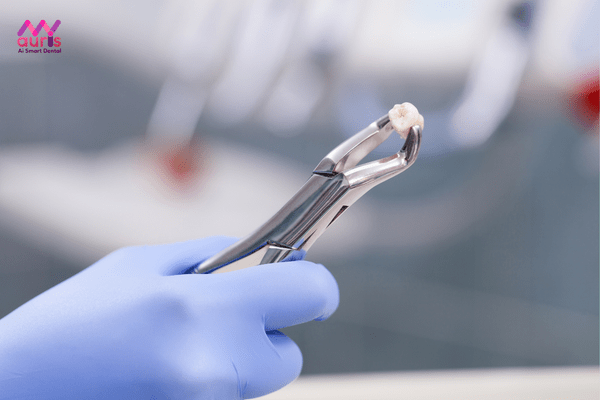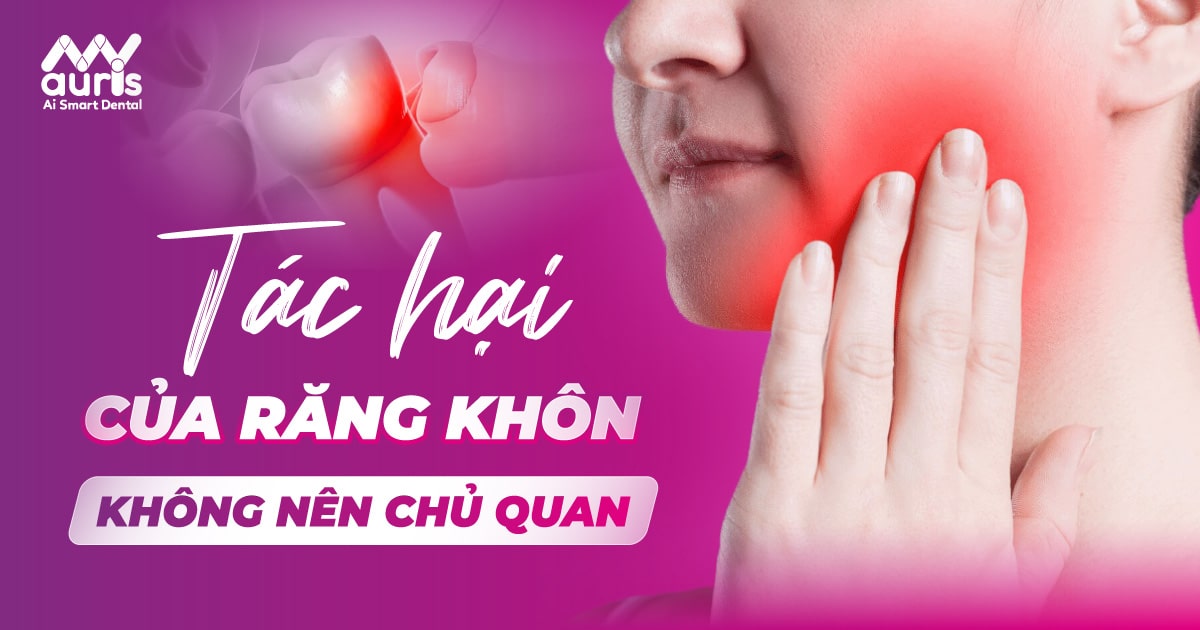Wisdom teeth are the last teeth to grow, at the angle of the jaw when reaching adulthood. That’s why anyone who reaches this stage is worried about the “moving” of their wisdom teeth. Because wisdom teeth rarely grow straight and in a row, they often tend to grow crookedly, causing many complications affecting health. Therefore, observing and monitoring the condition of wisdom teeth helps people take timely measures to prevent the harmful effects of wisdom teeth.
What are wisdom teeth?
In theory, wisdom teeth are the third molars, growing at the innermost corner of the jaw. And people have a total of 4 teeth growing in the 4 inner corners of the upper and lower jaw. When reaching the age of 17-25, wisdom teeth begin to show signs of emerging from the gums. However, the number of wisdom teeth grown in each person will be different. Because some people will only grow 2 lower teeth or 2 upper teeth, or some people will not grow at all.

Growing wisdom teeth cause many effects on life, daily activities as well as the health of the body. Because it not only causes persistent pain and discomfort but can also cause complications, especially with misaligned, impacted, oblique teeth, etc. Therefore, the harmful effects of wisdom teeth should not be subjective.
The harmful effects of wisdom teeth should not be subjective
As is known, misaligned wisdom teeth are more common than straight wisdom teeth. Because the moment wisdom teeth grow, the person’s jawbone stops growing, and there is no longer enough room for the wisdom teeth to emerge. This will cause teeth to grow misaligned, grow underground, or grow obliquely. It is these conditions that cause harmful effects of wisdom teeth that people should not ignore.
Misaligned growth affects tooth number 7
Misaligned wisdom tooth number 7 is one of the harmful effects of wisdom teeth that is very common. Wisdom teeth growing obliquely in the direction of tooth number 7 will tend to compress and pierce tooth number 7. Besides, wisdom teeth are large molars, so when they grow, they will have an impact. Strong force on tooth number 7 causes this tooth to loosen and can be damaged leading to tooth loss. If you encounter this condition, you will feel pain in both teeth number 7 and tooth number 8. At the same time, it affects the ability to chew food and sleep quality.
Gingivitis
Gingivitis is a disease caused by the gums developing abnormally, covering the roots of the teeth, causing wisdom teeth to not grow straight like normal teeth. Common symptoms of this condition are fever and swelling in the corner of the jaw. When observed, the gums may be red, swollen, pus-filled, and bleeding if the infection is severe.
Harmful effects of large gingivitis if not treated promptly: bad breath, difficulty opening the mouth, inability to chew, sensitive gums so unable to eat foodEat too hot or too cold. What’s more serious is that the infection spreads and affects neighboring teeth, with the fastest infection being teeth number 6 and 7.

Affects on reflexes and feelings
This is one of the harmful effects of wisdom teeth that makes people afraid. This condition is caused by impacted wisdom teeth pressing on the nerve. Initially, you will feel a gradual loss of sensation in your lips, skin, and mucous membranes. In addition, it can also cause sympathetic syndrome such as pain on the side of the face, swelling, etc.
Affects eating and nutrition of the body
Pain and discomfort at the location of wisdom teeth make it difficult for us to chew, open our mouth, eat and do daily activities. Therefore, it causes loss of appetite, skipping meals, loss of appetite, affecting nutrition and daily health. From there, it makes the body tired, exhausted, and difficult to concentrate at work.
Difficulty in oral hygiene
It is the pain and discomfort that makes people afraid of pain and lazy to brush their teeth and clean their teeth. This not only affects wisdom teeth, but other teeth in the jaw are also not kept clean, making them susceptible to tooth decay and other dental diseases.
Dental cyst
Misaligned wisdom teeth cause inflammation around the tooth root. Wisdom teeth only erupt a little, not completely, leaving behind a tooth pocket. Over time, jaw bone tumors form. If not treated promptly, it will negatively affect the jawbone.

Crowded teeth, misaligned jaw
Wisdom teeth lack space, so they grow in the jaw or overlap the teeth next to them. If not adjusted and treated for a long time, the jaw will shift.
Harmful effects of wisdom tooth extraction
Wisdom tooth extraction also causes complications if you choose an unreliable dentist, have poor, immature doctor skills as well as unreliable equipment and machines. security.
Not only is wisdom teeth harmful, but wisdom teeth extraction is also very dangerous. Some complications that can occur when wisdom teeth are extracted:
- Damage to the inferior alveolar nerve: inferior alveolar nerve located in the dental canal in the lower jaw bone – position nThis is very close to the lower wisdom teeth. In some cases, this nerve is also located right under the root of the lower wisdom tooth. If the skills and techniques are not good, extraction is too rough or not checking to detect that the tooth canal is close to the root of the wisdom tooth will cause damage to the lower dental nerve.
- Infection of the tooth socket: if the tooth is extracted under poor sterile conditions, it can easily cause infection of the tooth socket. This causes more swelling, pain, and difficulty swallowing after tooth extraction. More dangerous, the infection spreads into the blood and can lead to death.
- Damage to tooth number 7: if the tooth grows obliquely or hits tooth number 7 without the doctor making a good judgment, when removing wisdom teeth it can easily damage tooth number 7.
- Anaphylactic shock: occurs during the tooth extraction process, life-threatening if not treated promptly.
- Anesthetic poisoning: anesthetic is indispensable when performing tooth extraction. However, anesthetics also require safety, are licensed by the Ministry of Health and require doctors to use appropriate levels and correct techniques in treatment. If the concentration of anesthetic in the blood exceeds the threshold, it will lead to poisoning.

Therefore, to reduce complications and risks, people should choose a dentist that meets standards, quality, has a license, as well as a team of experienced, specialized doctors, modern equipment and machinery, especially the guaranteed sterility system.
Above, is information about the harmful effects of wisdom teeth as well as the harmful effects of wisdom tooth extraction that may be encountered. Therefore, having knowledge and information helps people recognize the signs so that they can handle and overcome them promptly.
The advice from My Auris dentistry to you is that you should research and choose a reputable, quality dentistry to avoid causing dangerous complications.





